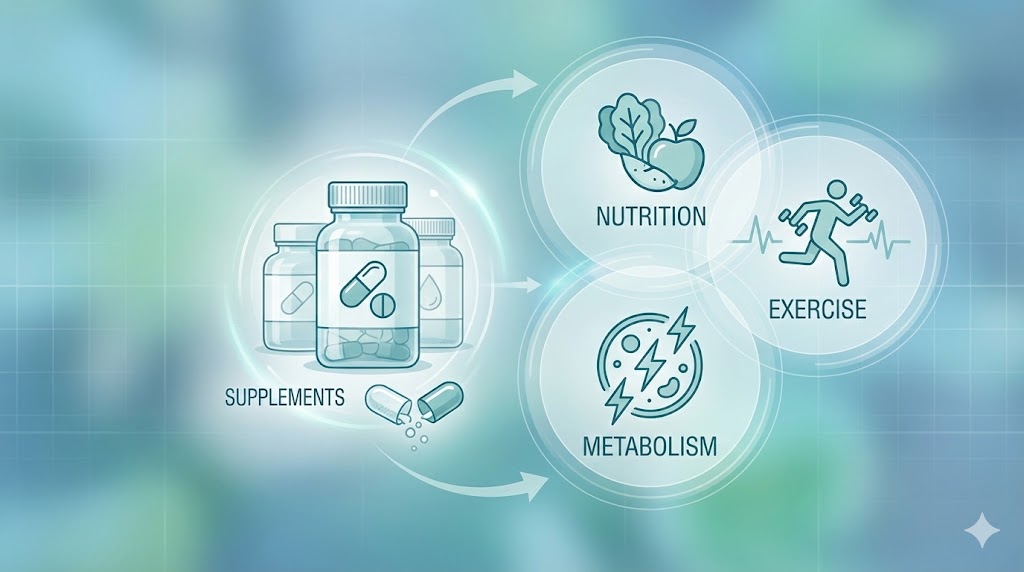
Table of Contents
- Introduction
- What is Intermittent Fasting?
- The Concept of Calorie Counting
- Comparing Weight Loss Effects
- Health Benefits and Risks
- Sustainability and Long-Term Success
- Combining Intermittent Fasting and Calorie Counting
- Practical Tips for Getting Started
- Conclusion
- FAQS
Introduction
Welcome to our blog post on Intermittent Fasting Compared to Calorie Counting. In the pursuit of effective weight management and a healthier lifestyle, various approaches have emerged. Two popular methods that often come up in discussions are intermittent fasting and calorie counting. Both approaches have their own principles and potential benefits. In this blog post, we will explore and compare intermittent fasting and calorie counting, examining their effects on weight loss, health, and sustainability. By understanding the similarities and differences between these two methods, you can make an informed decision about which approach suits you best. So let’s dive in!

What is Intermittent Fasting?
Intermittent fasting is not just a diet; it’s a pattern of eating that alternates between periods of fasting and eating. Rather than focusing on what foods to eat or avoid, intermittent fasting emphasizes when to eat. This approach taps into the body’s natural ability to go without food for extended periods and can be traced back to our early ancestors who often experienced periods of feast and famine.
There are several popular intermittent fasting methods, each with its own unique approach and schedule. The most common methods include:
(a) 16/8 Method:
This method involves fasting for 16 hours and restricting your eating window to 8 hours each day. For example, you might choose to skip breakfast and have your first meal around noon, then finish your last meal by 8 pm.
(b) 5:2 Diet:
With the 5:2 diet, you eat normally for five days of the week and reduce your calorie intake to 500-600 calories for the remaining two non-consecutive days. On fasting days, it’s important to choose nutrient-dense foods to support your body’s needs.
(c) Alternate-Day Fasting:
As the name suggests, alternate-day fasting involves alternating between fasting days and regular eating days. On fasting days, you significantly reduce your calorie intake or consume no more than 25% of your usual energy needs.
Benefits of intermittent fasting for weight loss and health:
Intermittent fasting has gained popularity for its potential benefits beyond weight loss. While individual results may vary, here are some potential advantages of intermittent fasting:
1. Weight loss:
Intermittent fasting can create a calorie deficit, leading to weight loss. By restricting the eating window or calorie intake, you may consume fewer calories overall, which can contribute to shedding excess pounds.
2. Improved Insulin Sensitivity
Intermittent fasting has been shown to improve insulin sensitivity, which is crucial for regulating blood sugar levels. Enhanced insulin sensitivity can potentially reduce the risk of type 2 diabetes and support overall metabolic health.
3. Enhanced Cellular Repair and Autophagy:
During fasting periods, your body initiates cellular repair processes and activates autophagy, a natural process where cells remove and recycle damaged components. This may have anti-aging and disease-fighting effects.
4. Reduced Inflammation:
Some studies suggest that intermittent fasting may help reduce inflammation in the body. Chronic inflammation is linked to various health conditions, including heart disease, diabetes, and certain cancers.
Potential challenges and considerations:
While intermittent fasting can offer numerous benefits, it may not be suitable for everyone. It’s important to consider the following challenges and factors before starting an intermittent fasting regimen:
Hunger and adjustment period:
Initially, adjusting to fasting periods may cause hunger and discomfort as your body adapts to the new eating pattern. However, these sensations often diminish over time as your body becomes accustomed to the fasting routine.
Individual variations:
Each person’s response to intermittent fasting can vary. Some individuals may find it easier to adhere to the fasting schedule, while others may struggle with hunger, energy levels, or other factors. It’s essential to listen to your body and modify the approach if needed.
Existing medical conditions and medications:
If you have underlying health conditions or take medications, it’s crucial to consult with a healthcare professional before starting intermittent fasting. They can provide personalized guidance based on your specific situation.
Sustainability:
Intermittent fasting is most effective when it becomes a sustainable lifestyle choice rather than a short-term fix. It’s important to assess whether intermittent fasting aligns with your long-term goals and preferences.
In the next section, we will delve into the concept of calorie counting and explore how it compares to intermittent fasting in terms of weight management and overall health.

The Concept of Calorie Counting
Calorie counting is a method of tracking and monitoring the number of calories consumed in your daily diet. It revolves around the fundamental principle that weight loss or weight gain is determined by the balance between the calories consumed and the calories burned. By keeping track of your calorie intake, you gain a better understanding of the energy content in the foods you eat and can make informed decisions about your dietary choices.
The process of calorie counting typically involves estimating the number of calories in each food or beverage you consume and keeping a record of your daily intake. This can be done manually by referring to food labels, nutritional databases, or utilizing smartphone applications and online tools designed for calorie tracking.
Benefits of calorie counting for weight management and health:
Calorie counting can offer several advantages when it comes to weight management and overall health:
1. Awareness of portion sizes:
By tracking calories, you become more aware of portion sizes and serving sizes, which helps you maintain a balanced diet and avoid overeating.
Creating a calorie deficit:
Calorie counting allows you to set a target calorie intake based on your weight goals. By consistently consuming fewer calories than your body requires, you can create a calorie deficit, leading to weight loss.
Flexibility in food choices:
Calorie counting does not necessarily restrict any specific foods or food groups. It focuses on balancing the overall calorie intake, allowing you to incorporate a wide variety of foods into your diet, as long as they fit within your daily calorie limit.
Educational aspect:
Calorie counting provides an opportunity to learn about the nutritional content of different foods and their calorie values. This knowledge can help you make healthier choices and develop a better understanding of your nutritional needs.
Potential challenges and considerations:
While calorie counting can be an effective approach, it is important to be aware of the following challenges and considerations:
1. Accuracy of Calorie Estimation:
Estimating calorie content can be challenging, as it often relies on general values rather than precise measurements. Variations in cooking methods, portion sizes, and individual metabolism can affect the accuracy of calorie calculations.
2. Focus Solely on Quantity:
Calorie counting primarily emphasizes quantity rather than quality. While staying within your calorie limit is important, it’s equally crucial to prioritize nutrient-dense foods that provide essential vitamins, minerals, and other beneficial compounds.
3. Obsessive behavior and negative relationship with food:
For some individuals, calorie counting can lead to obsessive behavior and an unhealthy preoccupation with numbers. This can potentially contribute to disordered eating patterns and a negative relationship with food. It’s important to approach calorie counting with a balanced mindset and seek support if needed.
4. Individual Variations and Metabolism:
Each person’s metabolism is unique, and the way their body processes and utilizes calories may differ. The effectiveness of calorie counting can vary depending on factors such as age, gender, activity level, and overall health.
In the next section, we will compare the weight loss effects of intermittent fasting and calorie counting, shedding light on their respective strengths and considerations.

Comparing Weight Loss Effects
When it comes to weight loss, both intermittent fasting and calorie counting have demonstrated potential effectiveness. Let’s explore how these approaches compare in terms of their impact on weight management.
Intermittent Fasting for Weight Loss:
Intermittent fasting can be an effective tool for weight loss due to the calorie restriction it naturally promotes. By compressing the eating window or reducing calorie intake on fasting days, it becomes easier to achieve a calorie deficit. Studies have shown that intermittent fasting can lead to significant weight loss and reductions in body fat. However, it’s important to note that individual results may vary, and factors such as adherence, overall diet quality, and physical activity levels can influence the outcomes.
Calorie Counting for Weight Loss:
Calorie counting is a precise method for managing weight loss by creating a controlled calorie deficit. By carefully monitoring your calorie intake and staying within your target range, you can effectively manage your weight. The advantage of calorie counting is that it provides flexibility in food choices as long as they fit within your daily calorie limit. It allows you to incorporate a variety of foods, including those you enjoy, into your diet while still achieving weight loss goals.
Which Approach is More Effective?
The effectiveness of intermittent fasting and calorie counting for weight loss may depend on individual preferences, lifestyle factors, and adherence. Some individuals find intermittent fasting easier to maintain due to structured eating patterns, while others prefer the flexibility of calorie counting. It’s important to choose an approach that suits your lifestyle and is sustainable for the long term. Additionally, combining intermittent fasting and calorie counting may offer synergistic benefits, allowing for a more personalized and balanced approach to weight management.
Considerations for Weight Loss:
Regardless of the approach chosen, a few key considerations can enhance the weight loss journey:
1. Nutritional Quality:
While both intermittent fasting and calorie counting can contribute to weight loss, it’s crucial to prioritize the quality of your food choices. Opt for whole, nutrient-dense foods that provide essential vitamins, minerals, and fiber. This helps support overall health and ensures you’re meeting your nutritional needs.
2. Physical Activity:
Incorporating regular physical activity into your routine is vital for overall health and weight management. Engaging in a combination of cardiovascular exercises, strength training, and other activities you enjoy can help optimize your weight loss efforts and improve overall fitness levels.
3. Individualization:
Every individual is unique, and what works for one person may not work for another. Experimentation and listening to your body are crucial. Pay attention to how you feel, both physically and mentally, while following a particular approach. Adjustments may be necessary to find the right balance for your individual needs.
In the next section, we will explore the health benefits and potential risks associated with intermittent fasting and calorie counting. Understanding these aspects is essential for making informed decisions about your health and well-being.

Health Benefits and Risks
Both intermittent fasting and calorie counting can have various health implications beyond weight management. Let’s explore the potential benefits and risks associated with these approaches.
Health Benefits of Intermittent Fasting:
1. Insulin Sensitivity Improvement:
Intermittent fasting has been shown to enhance insulin sensitivity, which is beneficial for managing blood sugar levels and reducing the risk of type 2 diabetes. Improved insulin sensitivity promotes better glucose regulation and may have positive effects on metabolic health.
2. Cellular Repair and Autophagy:
During fasting periods, the body initiates cellular repair processes and activates autophagy, a mechanism where cells remove damaged components. This cellular renewal and waste elimination process may have anti-aging effects and contribute to overall cellular health
3. Inflammation Reduction:
Some studies suggest that intermittent fasting may help reduce chronic low-grade inflammation in the body. By decreasing inflammation, intermittent fasting may potentially lower the risk of developing inflammatory conditions such as heart disease, certain cancers, and neurodegenerative disorders.
Health Risks and Considerations with Intermittent Fasting:
1. Potential Nutrient Deficiencies:
Depending on the specific eating patterns and food choices during the eating window, intermittent fasting could potentially result in nutrient deficiencies. It’s essential to ensure that meals consumed during the eating window are well-balanced and provide adequate vitamins, minerals, and essential nutrients.
2. Disordered Eating Tendencies:
Individuals with a history of disordered eating or those prone to developing unhealthy relationships with food may find intermittent fasting triggering. It’s important to approach intermittent fasting with a balanced mindset and seek guidance from healthcare professionals if needed.
3. Adverse Effects for Certain Populations:
Intermittent fasting may not be suitable for everyone, especially pregnant or breastfeeding women, individuals with certain medical conditions, or those taking specific medications. It’s crucial to consult with a healthcare provider before starting an intermittent fasting regimen.
Health Benefits of Calorie Counting:
1. Portion Control and Balanced Nutrition:
Calorie counting promotes awareness of portion sizes and helps individuals develop a better understanding of the energy content in different foods. It encourages portion control and facilitates a more balanced and nutritious diet.
2. Individualized Approach:
Calorie counting allows for personalization based on specific calorie needs, weight goals, and dietary preferences. It provides flexibility in food choices, enabling individuals to design a diet that suits their needs and preferences while still achieving weight loss or maintenance goals.
Health Risks and Considerations with Calorie Counting:
1. Obsessive Behavior and Mental Health:
For some individuals, meticulously tracking and counting calories can lead to obsessive behavior and negatively impact mental health. It’s essential to approach calorie counting with a balanced mindset and prioritize overall well-being.
2. Focus Solely on Quantity:
Calorie counting may sometimes overlook the quality of food choices. While staying within a calorie limit is important for weight management, it’s crucial to also prioritize nutrient-dense foods that support overall health and well-being.
3. Potential Inaccuracy in Calorie Estimation:
Estimating calorie content can be challenging, as values provided in food databases or on nutrition labels may not always be precise. Variations in cooking methods, portion sizes, and individual metabolism can affect the accuracy of calorie calculations.
It’s crucial to approach both intermittent fasting and calorie counting with awareness of individual needs, preferences, and overall health status. The next section will explore the sustainability and long-term success factors of these approaches, which play a significant role in achieving lasting lifestyle changes.

Sustainability and Long-Term Success
When considering any dietary approach, sustainability and long-term adherence are crucial factors for achieving lasting success. Let’s delve into how both intermittent fasting and calorie counting can be approached in a sustainable manner.
Sustainability of Intermittent Fasting:
Intermittent fasting can be sustainable when individuals find a fasting schedule that aligns with their lifestyle and preferences. Here are some tips to enhance sustainability:
1. Experiment and find what works for you:
There are various intermittent fasting methods, and it’s important to find the one that suits you best. Experiment with different fasting schedules and eating windows to identify what feels sustainable and enjoyable.
2. Gradual Implementation:
If you’re new to intermittent fasting, consider starting with shorter fasting periods and gradually increasing the duration as you become more comfortable. This can help your body adjust and make the transition smoother.
3. Flexibility and Adaptability:
Intermittent fasting doesn’t have to be rigid. Allow for flexibility in your fasting schedule when needed, such as during social gatherings or special occasions. Being adaptable can make it easier to stick to the fasting routine in the long run
4. Focus on Overall Diet Quality:
While intermittent fasting focuses on when you eat, it’s essential to also prioritize the quality of your meals. Incorporate whole, nutrient-dense foods into your eating window to ensure you’re meeting your nutritional needs.
Sustainability of Calorie Counting:
Calorie counting can be sustained by adopting a balanced approach that prioritizes overall health and well-being. Consider the following strategies for long-term success:
1. Education and Meal Planning:
Educate yourself about portion sizes, nutritional values, and calorie content of different foods. Plan your meals in advance to ensure you’re meeting your calorie goals while also providing a well-rounded and nourishing diet.
2. Flexible Calorie Allocation:
Allow for flexibility in how you distribute your calories throughout the day. Adapt your calorie intake based on your activity level and personal preferences, focusing on a balanced distribution of macronutrients.
3. Incorporate Mindful Eating Practices:
Calorie counting doesn’t mean ignoring hunger cues or depriving yourself of enjoyable meals. Practice mindful eating by paying attention to hunger and fullness signals, savoring your meals, and cultivating a positive relationship with food.
4. Monitoring Progress and Adjustments:
Regularly assess your progress and make adjustments as needed. If you find certain aspects of calorie counting challenging or unsustainable, modify your approach to better suit your lifestyle and preferences.
Creating Lasting Lifestyle Changes:
To achieve long-term success, it’s important to view both intermittent fasting and calorie counting as tools for creating sustainable lifestyle changes:
1. Consistency and Patience:
Consistency is key when it comes to adopting new eating habits. Stay committed to your chosen approach and be patient with the process. Sustainable weight management takes time and requires a long-term perspective.
2. Physical Activity and Overall Well-Being:
Incorporate regular physical activity into your routine to support overall health and enhance weight management efforts. Focus on activities that you enjoy, as this increases the likelihood of long-term adherence.
3. Seek Support if Needed:
If you find it challenging to navigate dietary changes or maintain motivation, seek support from healthcare professionals, registered dietitians, or support groups. They can provide guidance, accountability, and help you address any concerns or challenges you may encounter.
4. Lifestyle Integration:
Aim to integrate intermittent fasting or calorie counting into your lifestyle seamlessly. Instead of viewing them as short-term interventions, strive to create sustainable habits that promote a balanced and healthy approach to eating.
Remember, what works for one person may not work for another. Listen to your body, be mindful of your individual needs, and make choices that align with your overall well-being.

Combining Intermittent Fasting and Calorie Counting
For individuals seeking a more personalized and balanced approach to weight management, combining intermittent fasting and calorie counting can offer synergistic benefits. By integrating both strategies, you can harness the advantages of both methods and tailor them to suit your specific needs. Here’s how you can effectively combine intermittent fasting and calorie counting:
1. Choose an Intermittent Fasting Schedule:
Select an intermittent fasting schedule that aligns with your lifestyle and preferences. Popular options include the 16/8 method (16 hours of fasting and an 8-hour eating window) or the 5:2 method (eating normally for 5 days and restricting calories for 2 non-consecutive days). Adjust the fasting schedule according to your goals and comfort level.
2. Set a Calorie Goal:
Determine your daily calorie goal based on factors such as your age, sex, weight, activity level, and weight loss objectives. This can be done by consulting a registered dietitian or using online calculators. Ensure that your calorie target creates a reasonable and sustainable calorie deficit for gradual weight loss.
3. Plan Meals and Track Calories:
Plan your meals within your designated eating window while adhering to your calorie goal. Utilize calorie tracking apps or food diaries to monitor your calorie intake accurately. Be mindful of portion sizes and include a balance of macronutrients (carbohydrates, proteins, and fats) to support your nutritional needs.
4. Focus on Nutrient-Dense Foods:
Emphasize the importance of consuming nutrient-dense foods to ensure you’re meeting your nutritional requirements while staying within your calorie limit. Prioritize fruits, vegetables, lean proteins, whole grains, and healthy fats. These foods provide essential nutrients and support overall health.
5. Listen to Your Body:
Pay attention to your body’s hunger and fullness cues. Intermittent fasting can help regulate appetite, but it’s crucial to respond to your body’s signals appropriately. Avoid restrictive behaviors and allow yourself to eat until satisfied within your designated eating window.
6. Regular Physical Activity:
Incorporate regular exercise into your routine to support weight loss, improve fitness, and enhance overall health. Engage in a combination of cardiovascular exercises, strength training, and activities you enjoy. Remember that physical activity should complement your dietary approach and align with your energy levels.
7. Monitor Progress and Adjust as Needed:
Regularly evaluate your progress and make adjustments if necessary. If you’re not experiencing the desired weight loss or if you’re finding the combination of intermittent fasting and calorie counting challenging, consider seeking guidance from a healthcare professional or registered dietitian. They can help tailor the approach to better suit your individual needs.
By combining intermittent fasting and calorie counting, you can create a customized and adaptable approach to weight management. However, it’s important to remember that this strategy may not be suitable for everyone. Individual preferences, medical conditions, and lifestyle factors should be taken into account. Consulting with a healthcare professional can provide personalized guidance and support.

Conclusion
In the quest for weight management and overall health, both intermittent fasting and calorie counting offer viable approaches with unique benefits and considerations. Intermittent fasting focuses on when you eat, while calorie counting emphasizes the quantity of food consumed. Understanding the nuances of each method allows you to make an informed decision based on your preferences and goals.
Intermittent fasting provides benefits beyond weight loss, such as improved insulin sensitivity, cellular repair, and potential inflammation reduction. However, it may not be suitable for everyone, and careful consideration of potential nutrient deficiencies and disordered eating tendencies is crucial.
On the other hand, calorie counting promotes portion control and a balanced diet, allowing for personalization based on individual calorie needs and dietary preferences. It encourages mindful eating and can be adapted to various lifestyles. However, it requires attention to food quality, awareness of potential mental health impacts, and the need to accurately estimate calorie content.
While both approaches have their advantages and limitations, it’s important to prioritize sustainability and long-term adherence. Finding an approach that aligns with your lifestyle, preferences, and overall well-being is key. Combining intermittent fasting and calorie counting can offer a synergistic approach, allowing you to harness the benefits of both methods and create a customized approach to weight management.
Remember, achieving lasting lifestyle changes requires patience, consistency, and a holistic approach. Prioritize nutrient-dense foods, engage in regular physical activity, and listen to your body’s signals. Seek support from healthcare professionals or registered dietitians to navigate any challenges or concerns along the way.
Ultimately, the choice between intermittent fasting and calorie counting, or the combination of both, is a personal one. Consider your goals, lifestyle, and individual needs when determining the approach that best suits you. Embrace a sustainable and balanced mindset, and view your dietary choices as part of a lifelong journey toward optimal health and well-being.
As always, consult with a healthcare professional or registered dietitian before making any significant changes to your diet or lifestyle. They can provide personalized guidance, consider any underlying health conditions, and help you make informed decisions that support your overall health and well-being.

Frequently Asked Questions (FAQs)
Is intermittent fasting suitable for everyone?
Intermittent fasting may not be suitable for everyone, especially those with certain medical conditions, pregnant or breastfeeding individuals, or individuals with a history of disordered eating. It’s important to consult with a healthcare professional or registered dietitian to determine if intermittent fasting is appropriate for you.
Can I drink water or other beverages during the fasting period?
Yes, staying hydrated is essential during fasting periods. Water, unsweetened tea, and black coffee are generally allowed and can help keep you hydrated and manage hunger sensations.
Will intermittent fasting lead to muscle loss?
When done correctly and accompanied by regular exercise, intermittent fasting is unlikely to cause muscle loss. Maintaining an adequate protein intake and engaging in resistance training can help preserve muscle mass during weight loss.
Can I follow intermittent fasting if I have a physically demanding job or engage in intense workouts?
Intermittent fasting can be adapted to accommodate physically demanding jobs or intense workouts. Adjusting your fasting and eating windows to align with your activity schedule and ensuring adequate nutrition during the eating window is crucial. Consulting with a healthcare professional or registered dietitian can help tailor the approach to your specific needs.
How accurate do I need to be with calorie counting?
While it’s important to have a general understanding of calorie content, being overly precise with calorie counting is not necessary for most individuals. Focus on consistency, portion control, and making overall healthy choices rather than striving for exact calorie counts.
Can calorie counting lead to an unhealthy obsession with food?
Calorie counting has the potential to trigger obsessive thoughts or unhealthy relationships with food in some individuals. It’s crucial to approach calorie counting with a balanced mindset, prioritize nutrient-dense foods, and be aware of any negative psychological effects. If you have a history of disordered eating or find it difficult to maintain a healthy mindset, it’s advisable to consult with a healthcare professional or registered dietitian.
How can I make intermittent fasting or calorie counting more sustainable in the long term?
To make intermittent fasting or calorie counting sustainable, it’s important to find a schedule or approach that suits your lifestyle and preferences. Gradual implementation, flexibility, focus on overall diet quality, and seeking support when needed can all contribute to long-term success and adherence.
Can I combine intermittent fasting and calorie counting?
Yes, combining intermittent fasting and calorie counting is possible and can offer a synergistic approach. By setting a calorie goal within your eating window during intermittent fasting, you can benefit from the advantages of both methods. However, it’s important to ensure that the combined approach is sustainable and suits your individual needs.
Is it normal to experience hunger during intermittent fasting?
Feeling hunger sensations during fasting periods is normal and expected, especially during the initial stages. However, the intensity of hunger tends to decrease over time as your body adjusts to the fasting routine. Staying hydrated and distracting yourself with activities can help manage hunger pangs.
Can intermittent fasting or calorie counting be used as a long-term weight management strategy?
Both intermittent fasting and calorie counting can be used as long-term weight management strategies, but they should be viewed as part of a comprehensive and sustainable approach. It’s important to focus on overall lifestyle changes, such as incorporating regular physical activity, mindful eating, and creating a balanced and nourishing diet.

Articles of Interest
Boost Your Metabolism Naturally: Unconventional Methods That Work
The Gut-Brain Connection: Understanding the Importance of Gut Health
The Surprising Science of Intermittent Fasting: A Proven Weight Loss Strategy











